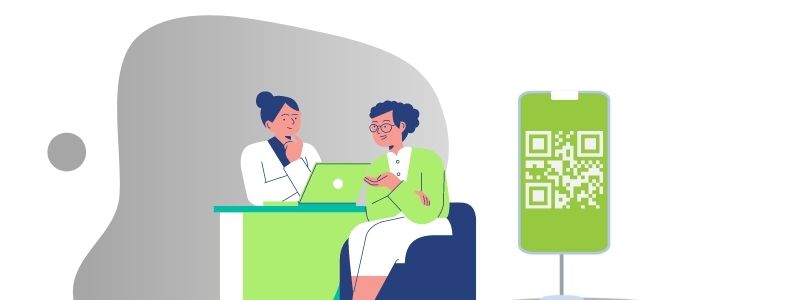The healthcare industry is experiencing a transformative shift with the integration of technology, and Quick Response (QR) codes have emerged as a powerful tool for enhancing patient engagement. From facilitating access to medical information to streamlining appointment processes, QR codes are reshaping the patient experience and contributing to a more connected and efficient healthcare ecosystem. In this article, we explore the significant impact of QR codes in healthcare and how they are fostering improved patient engagement.
1. Access to Personal Health Information:
QR codes provide a secure and efficient way for patients to access their personal health information. By incorporating QR codes on medical records, prescription labels, or patient portals, healthcare providers empower individuals to retrieve important data such as test results, medication instructions, and treatment plans. This instant access enhances transparency and encourages patients to take an active role in managing their health.
2. Streamlining Appointment Processes:
QR codes streamline appointment processes, making scheduling and check-ins more efficient. Appointment confirmations, reminders, and even electronic check-in systems often utilize QR codes. Patients can scan these codes with their smartphones, confirming their attendance or providing necessary information without the need for lengthy paperwork or manual check-in procedures.
3. Medication Management and Adherence:
Improving medication adherence is a critical aspect of healthcare, and QR codes play a role in facilitating better medication management. Prescription labels with QR codes can link patients to detailed information about their medications, including dosage instructions, potential side effects, and refill options. This additional information fosters understanding and increases the likelihood of patients adhering to their prescribed treatment plans.
4. Telemedicine and Virtual Consultations:
The rise of telemedicine has been accelerated by the integration of QR codes. Healthcare providers can include QR codes in appointment confirmations or communication materials, allowing patients to easily join virtual consultations with a simple scan. This enhances accessibility to healthcare services, especially for those who may face challenges in attending in-person appointments.
5. Health and Wellness Resources:
QR codes connect patients to a wealth of health and wellness resources. Healthcare providers can include QR codes on educational materials, pamphlets, or posters that link to online resources, articles, or videos. This empowers patients to access additional information about their conditions, preventive measures, and lifestyle recommendations, fostering a proactive approach to their well-being.
6. Contactless Check-ins and Payments:
Especially relevant in the context of the global pandemic, QR codes facilitate contactless check-ins and payments at healthcare facilities. Patients can scan QR codes at entry points, confirming their arrival without physical contact. Additionally, QR codes can be employed for secure and convenient payment processes, reducing the reliance on cash or card transactions.
7. Emergency Medical Information:
QR codes are valuable in emergency situations where quick access to medical information is crucial. Patients can wear or carry items, such as bracelets or cards, containing QR codes that link to their emergency medical records. This rapid access to critical information aids healthcare professionals in making informed decisions during emergencies.
8. Patient Engagement in Clinical Trials:
For patients participating in clinical trials, QR codes simplify the process of accessing study-related information. Participants can scan QR codes on study materials or documentation to quickly navigate to relevant online resources, making it easier for them to stay informed about the trial’s progress and requirements.
Conclusion:
The integration of QR codes in healthcare is undeniably enhancing patient engagement and transforming the way individuals interact with the healthcare system. From empowering patients with access to their health information to facilitating contactless processes and improving medication adherence, QR codes are playing a pivotal role in creating a more patient-centric and connected healthcare experience. As technology continues to advance, the potential applications of QR codes in healthcare are likely to expand, offering new opportunities to improve patient engagement and outcomes.

